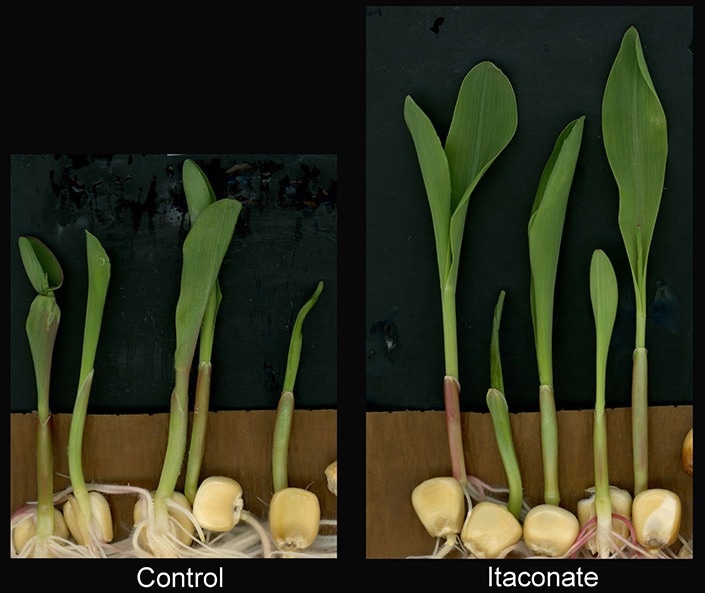Reviewed by Lexie CornerJun 9 2025
Itaconate is a naturally occurring molecule that plays an important role in the immune system of animals. It acts as a protective agent against inflammation and viral infections. Classified as a metabolite, itaconate is produced when living organisms break down food for energy.
 Corn plants that were watered with the metabolite itaconate grew taller (right) than those that were not (left). Image Credit: University of California, San Diego
Corn plants that were watered with the metabolite itaconate grew taller (right) than those that were not (left). Image Credit: University of California, San Diego
While its role in animals is well understood, itaconate’s presence and function in plants have not been widely studied. For the first time, biologists at the University of California, San Diego, have investigated its role in plants in detail.
Using chemical imaging and measurement tools, researchers from the School of Biological Sciences - working with colleagues from Stanford University, Peking University, the Carnegie Institution for Science, and Universidad Nacional Autónoma de México - confirmed both the presence of itaconate in plants and its contribution to plant growth.
We found that itaconate is made in plants, particularly in growing cells. Watering maize (corn) plants with itaconate made seedlings grow taller, which was exciting and encouraged us to investigate this metabolite further and understand how it interacts with plant proteins.
Jazz Dickinson, Study Senior Author and Assistant Professor, Department of Cell and Developmental Biology, University of California, San Diego
The study was partially funded by the National Institutes of Health and the National Science Foundation. The findings were published in Science Advances on June 6, 2025.
Dickinson’s lab, which focuses on plant development and root system dynamics, led the research.
The researchers used mass spectrometry to confirm itaconate’s presence in plants. This imaging technique detects specific molecules and reveals chemical composition. They also collaborated with animal biochemists who study itaconate to examine how the molecule interacts with plant-specific proteins in Arabidopsis, a plant in the mustard family.
Their analysis showed that itaconate plays several key roles in plant physiology. These include involvement in basic metabolic processes and helping plants respond to oxygen-related stress.
Using the natural benefits of itaconate, rather than relying on synthetic chemicals, could be important for safely boosting agricultural yields to support a growing global population.
Dickinson added, “This discovery could lead to nature-inspired solutions to improve the growth of crops, like corn. We also hope that developing a better understanding of the connections between plant and animal biology will reveal new insights that can help both plant and human health.”
Because humans also produce and use itaconate, the study may also shed light on how this molecule functions in human growth and development.
Source:
Journal reference:
Zhang, T., et al. (2025) The metabolite itaconate is a transcriptional and posttranslational modulator of plant metabolism, development, and stress response. Science Advances. doi.org/10.1126/sciadv.adt7463.